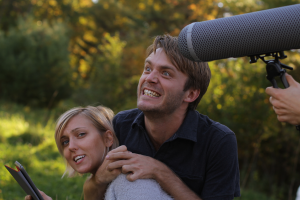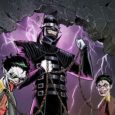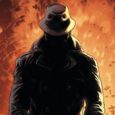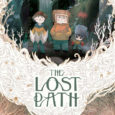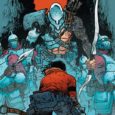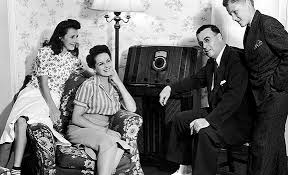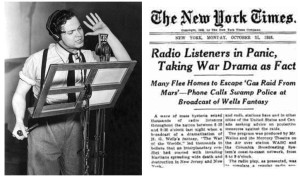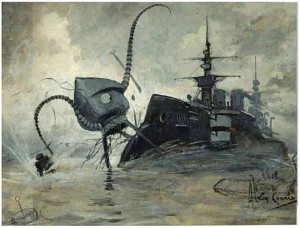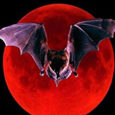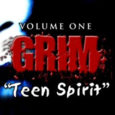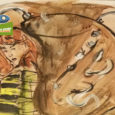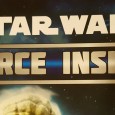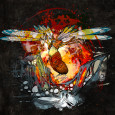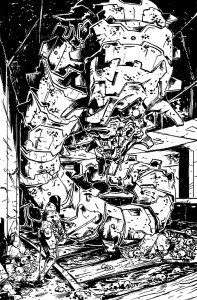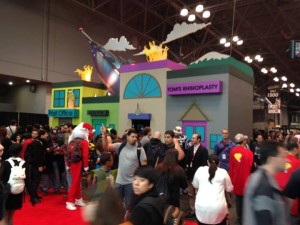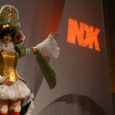That’s but a taste of the haunting 2008 graphic novel series Locke & Key brought to life. In this snippet, Kate Mulgrew (Red, Orange is the New Black) plays hateful grandmother Candice Whedon to Aaron Lockman’s mentally challenged Rufus Whedon. Locke & Key is the first of its kind, a graphic novel, written by Joe Hill and art by Gabriel Rodriguez, adapted into the audiobook medium. While Stephen King once described his attempt to write a modern radio play as a failure to reincarnate a dead medium, his son’s chilling tale has exceeded all expectations, joining the likes of successful audio dramas like the podcasts Serial and the immensely popular Welcome to Night Vale.
Part of what makes Locke & Key work is not only the fact that much of it was recorded in locations similar to that seen in the graphic novel instead of a regular studio to help actors get into character, but the phenomenal voice cast who bring the characters to life. For me, it was Ian Alan Carlsen’s menacing voicework as Dodge/Lucas Caravaggio/Zack Wells and Tatiana Maslany’s ethereal blend of menacing and inviting Dodge/Demon-in-the-Well that got me fully invested. Their combined understanding and performance of the villainous character made it all the more memorable and somehow added more depth to Dodge than was in the pages of the graphic novel. The rest of the Locke & Key players are also perfectly cast, from the guarded vulnerability of Brennan Lee Mulligan as Tyler Locke to the sweet innocence of Betsy Kenney as Bode Locke to the lovely Lisa Stathoplos as struggling alcoholic Nina Locke. I don’t even have words for Jaime Alyse Andrews’ rendition of Kinsey Locke, particularly at her delivery during the more emotional scenes between her and her mother.
Apprehension at listening to an adapted comic book versus an adapted a novel is understandable, as one wonders if something would be lost in transitioning the story from a visual medium to a purely audio format. Luckily those worries are dismissed withing minutes of listening. The effort in creating a higher production value is apparent as you listen, perhaps as a result of recording outside of a conventional venue. Peter Van Riet’s original score welcomes you to Keyhouse Manor with notes of foreboding, and makes the 13 hours of audiobook fly by. To help transition more fluidly, some scenes were briefly introduced by the narrator, and there were lots of neat sound effects, particularly for shadows during the Crown of Shadows arc. All together these helped replace a panel layout to better utilize your imagination when listening along.
Overall, it’s a feast for your fucking ears.
I finished the audiobook just in time to experience an immersive Oculus Rift experience at New York Comic Con this past weekend, courtesy of the Audible booth, where we got a peek at a pivotal scene from the comics between Bode and Dodge set to the performance in the audio book.
Be sure to keep an eye on AudioComics for future projects, subscribe to their Youtube, follow their twitter, and if you’ve had the blessed opportunity to listen to this amazing adaptation, leave a review over on Audible! After all, Locke & Key is free to download until November 4th, 2015…if you dare.
Knowing that graphic novels CAN be adapted to an audiobook whets my appetite for more properties to explore this medium. Rat Queens anyone? What would you like to see adapted in the future?
Leia Calderon
Editor
@ladyvader99
I attempted to travel back in time recently. I sat with a cup of tea in my humid kitchen without a phone or Facebook to distract me from an evening with 1938 and the radio drama The War of the Worlds. The hour-long broadcast transformed H.G. Wells’ original science fiction novella into a terrifying realistic moment in the history of horror fiction. While the production can be lauded as a drama and for the terror that it caused when it was originally aired, works of horror have their own finicky scale that incessantly weighs a work’s merit. No matter how well-written, how convincing the effects, or how well-received by its contemporary audience, the real judgement of a masterpiece of the genre will always come down to this question: “Okay, but is it scary?”
Honestly, I’d have to say no, not really. Creepy, sure. But right after the decades-old sign-off, the stillness of my kitchen did not freak me out as I happily made myself a midnight snack.Well, now that I’ve gotten that unfortunate truth out of the way, let’s talk about how completely awesome this production is. The adaptation passes as a real radio news broadcast, which begins with the announcement of a flaming object falling from the sky interrupts chipper orchestrated dance music. The bulletins grow more dire as “live” broadcasts describe the invaders with “V-shaped [mouths] with saliva dripping from its rimless lips that seem to quiver and pulsate.” As the broadcast continues, it is clear earth is losing its most desperate battle to survive as resistance fighters vanish from the air in audible death throws.
While clearly produced with care and great effects, the best segments of The War of the World are unsurprisingly Orson Welles monologues. Through his singular voice and without aid of sound effects, listeners are dragged into a lifeless and helpless earth. From the opening narration that set the stage of an unprepared and blissfully ignorant earth to the final trudge through a decimated Time Square, Welles will have you mesmerized, if not quite terrified.
What did approach truly chilling was not the descriptions of Martians’ rays or the rapid elimination of all life on earth, but the interaction of Welles’ Doctor Pierson with the character only known as “The Stranger.” Their conversation is part of the last third of the production that moves away from the news broadcast style. The Stranger condemns the direction humanity has gone and almost gleefully muses how the majority of people are doomed.
STRANGER: I’m going on. . . right under their feet. I got a plan. We men as men are finished. We don’t know enough. We gotta learn plenty before we’ve got a chance. And we’ve got to live and keep free while we learn, see? I’ve thought it all out, see.
PIERSON: Tell me the rest.
STRANGER: Well, it isn’t all of us that were made for wild beasts, and that’s what it’s got to be. That’s why I watched YOU. All these little office workers that used to live in these houses — they’d be no good. They haven’t any stuff to ’em. They just used to run off to work. I’ve seen hundreds of ’em, running wild to catch their commuter train in the morning for fear they’d get canned if they didn’t; running back at night afraid they won’t be in time for dinner. Lives insured and a little invested in case of accidents. And on Sundays, worried about the hereafter. The Martians will be a godsend for those guys. Nice roomy cages, good food, careful breeding, no worries. After a week or so chasing about the fields on empty stomachs they’ll come and be glad to be caught.
It is The Stranger that I find scary and it his view of our world that I find unnerving. I think he captures what could be considered the only timelessly terrifying part the of radio play. Horror is so often dismissed as pulp or lowbrow, much to many fans’ displeasure. However, I’d argue that most horror is not wriiten to be a character study of the shrieking blonde running from a masked killer, but of the reader and the darkest fears within us all.
Back in the day, the original broadcast was convincing enough to convince real listeners, if only a few, into panic. It is unfortunate that it cannot invoke the same kind of terror. The crackling of old time radio through my itunes on my glowing macbook just doesn’t quite resonate as it was intended to. This makes me more sad than dismissive. In fact, Stephen King, in his introduction to Everything’s Eventual, discussed his attempts to write a modern radio play. He sucked, is the short of it. I’m glad for Welcome to Nightvale, the popular monthly horror podcast, that proves the art form isn’t dead.


